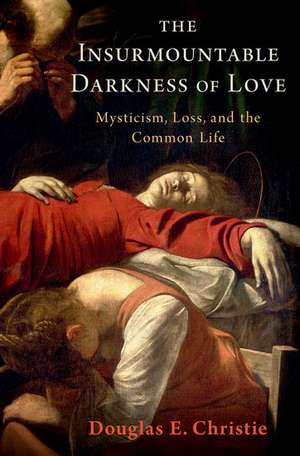The Insurmountable Darkness of Love: Mysticism, Loss, and the Common Life
Autor Douglas E. Christieen Limba Engleză Hardback – 16 aug 2022
The primary aim of this book is to reconsider the meaning of darkness within mystical and contemplative thought and practice--especially as the ground and source of love. The book examines how a sustained, critical attention to apophatic spiritual traditions can help us respond to the gaps, silences, and empty places that have become such a prominent feature of contemporary experience. Contemplative practice rooted in unknowing reflects a deep respect for the unsayable, but also comes to expression in a rich and varied poetry of darkness that limns loss and absence with great delicacy, grace and courage. This book considers how critical retrieval of this poetry--especially that arising from ancient Christian traditions of the via negativa--can help us engage and respond to our own experiences of loss and absence. It argues that our experience of contemplative spiritual practice can be revitalized by attending more carefully to the darkness that so often surrounds and courses through it, not only as part of personal practice but also as part of the shared work of recovering and deepening what the Christian mystical tradition often refers to simply as "the common life." Or what the thirteenth-century Flemish mystic Hadewijch of Antwerp calls "the insurmountable darkness of love."
Preț: 189.65 lei
Preț vechi: 217.02 lei
-13% Nou
36.29€ • 37.75$ • 29.96£
Carte disponibilă
Livrare economică 13-19 martie
Livrare express 07-13 martie pentru 59.50 lei
Specificații
ISBN-10: 0190885165
Pagini: 320
Dimensiuni: 242 x 165 x 29 mm
Greutate: 0.58 kg
Editura: Oxford University Press
Colecția OUP USA
Locul publicării:New York, United States
Recenzii
Seekers and contemplatives from other traditions, or no tradition, will find in The Insurmountable Darkness of Love a deep and attractive point of access to the riches of contemplative Christianity.
Intimacy and absence have rarely been explored in tandem with the care and attention manifest in The Insurmountable Darkness of Love, a book as valuable for the extraordinary range of voices it collects as for its conviction that loss and desolation are experiences from which we have much to learn. In the many sites, texts and personal memories it explores, Douglas Christie's book invites us to recognize and reflect on our own heterotopias, and what we might then offer the world, by dwelling in these spaces of otherness.
In his powerful, original and important new work, Douglas Christie explores the intersection of personal loss, atrocity, and apophatic mystical texts, suggesting how a contemplative ethos can discover in the isolating experience of personal and social trauma the ground of a renewed and deepened solidarity. Seekers and contemplatives from other traditions, or no tradition, will find in The Insurmountable Darkness of Love a deep and attractive point of access to the riches of contemplative Christianity.
I have been pursuing the love 'born of and nurtured by darkness' all of my life. In The Insurmountable Darkness of Love, Douglas Christie invites readers to embark on a journey of 'silent attention' awakening, shedding, and finally the embrace of what cannot be known. So, how do you write about something that cannot be captured in words? Christie uses vulnerability, life stories and memories as well as excellent scholarship. The end result is breathtaking!
With all the tumult, chaos and uncertainty in our world, we need a spiritual compass to navigate the pain and suffering that is part and parcel of being soulfully alive today. As our most poetic and compassionate scholar of contemplative practice, Douglas Christie guides us on a most profound journey into the darkness that underlies many mystical experiences, one that is ultimately redemptive. At no time in human history have we needed a prophetic voice like Christie's as we do now.
Maybe the key word in all the world's religions is emptiness. But it takes a Laozi or a Thomas Merton to map it. Or generous and wise Douglas Christie. I cannot think of a book with more heart or with such tenderness for our 'apocalyptic psyche.' His lyrical, learned, gentle book holds us to the 'blank, unnamed, empty, unknown,' where 'Love itself is a desert.'
Douglas Christie's The Insurmountable Darkness of Love is a moving exploration of apophatic experience and language in the contemporary retrieval of contemplation. The book daringly combines several different genres
The Insurmountable Darkness of Love is remarkable not just for its depth of insight and its mining of the rich veins of the contemplative tradition, but also for its piercing honesty. It probes the loves, the losses, the tender frailties of us all and reflects the author's unflinching conviction regarding the power of darkness to heal, to reveal love that never allows anyone to be lost. Readers will be grateful to be in Christie's debt for the gift of this book, for all the beauty, insight, trust, and hope it bestows.
Notă biografică
Douglas E. Christie is a professor in the Theological Studies Department at Loyola Marymount University in Los Angeles. Some of his publications include The Word in The Desert: Scripture and the Quest for Holiness in Early Christian Monasticism (Oxford), and The Blue Sapphire of the Mind: Notes for a Contemplative Ecology (Oxford).
